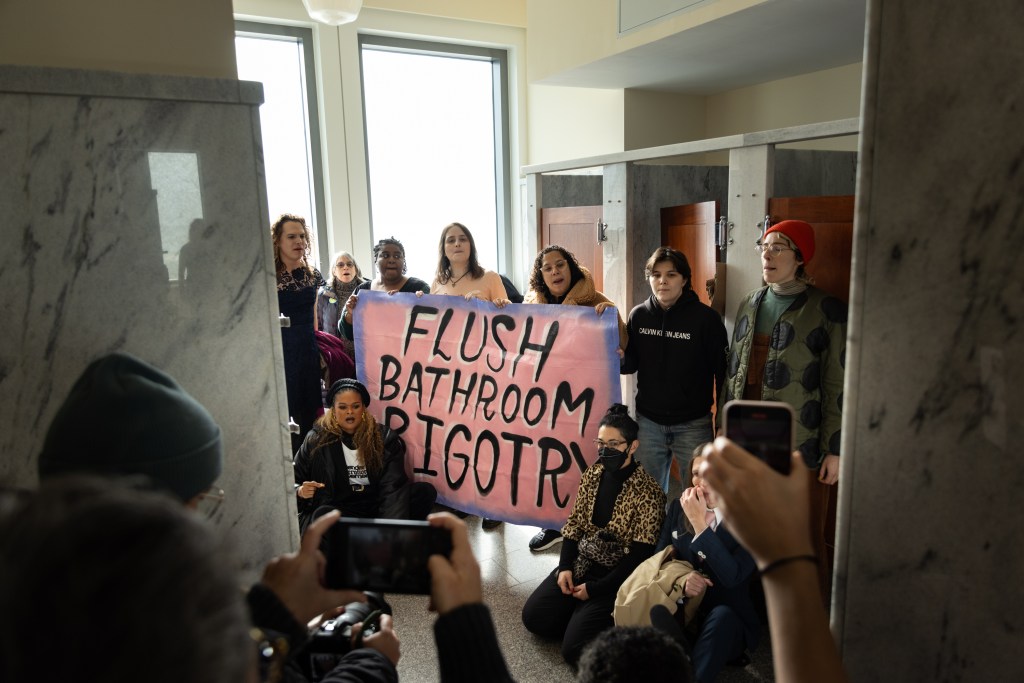The fight for trans rights is beyond the ‘visibility era’: ‘This moment calls for radical defiance’

The Gender Liberation Movement is an organisation focused on “centering bodily autonomy, self-determination, the pursuit of fulfilment, and collectivism in the face of gender-based sociopolitical threats”.(Kevin Dietsch/Getty Images)
Just over a decade ago, in 2014, TIME magazine declared on its front cover that we were at the “The Transgender Tipping Point“.
The cover itself was simple, a full body shot of actress Laverne Cox – who was then playing Sophia Burset on Netflix game-changer Orange Is the New Black – and a byline for writer Katy Steinmetz, who said in the piece that trans rights would be the next civil rights frontier.
“We are in a place now,” Cox told the magazine at the time, “where more and more trans people want to come forward and say, ‘This is who I am.’ And more trans people are willing to tell their stories. More of us are living visibly and pursuing our dreams visibly, so people can say, ‘Oh yeah, I know someone who is trans.’ When people have points of reference that are humanising, that demystifies difference.”
“The Transgender Tipping Point” was a phrase, Jude Ellison S. Doyle noted for Xtra Magazine on the cover’s 10th anniversary, that quickly became ubiquitous across the media, with – often more than not cis – academics and cultural commentators alike pointing to the piece as an example of a paradigm shift on trans visibility and representation in public life.
But, as many more have since pointed out, the catch-all-ness of the phrase is oversimplified and ignores the intersectional struggles and delicate nuances of trans people’s lives that go far beyond ‘being visible’. It also became somewhat of an ironic joke between trans folks who had to wake up the day after that edition of TIME hit the shelves go about their lives, this supposed-watershed moment of greater visibility not helping them pay their bills, access gender-affirming care or walk through the streets without fear.
In 2025, trans people are indeed more visible than ever, but that visibility has also brought forth greater scrutiny, misinformation, discrimination and hatred. Much of Donald Trump’s election campaign was centred on anti-trans falsehoods whilst hate crime rates are soaring across the US and hundreds of anti-trans bills were tabled in 2024, with one already passing so far this year – just three weeks in.
“If trans people have ‘tipped’ in any direction, it’s backward,” Doyle wrote.
For activist Raquel Willis, co-founder of the Gender Liberation Movement alongside Eliel Cruz, the fight for trans rights and universal bodily autonomy has to move past the visibility era to be truly impactful.
“This idea of simply using visibility as a means to bring about the kind of culture and society that’s going to receive trans folks with the respects that we deserve is over,” she told PinkNews, “and so we have to be thinking in new ways about how to protect ourselves, our voices, our histories and our brilliance without relying on a lot of the institutions that have really pushed the visibility vehicle.”
Speaking exclusively with PinkNews, Willis and Cruz discussed the organisation, intersectionality and the need for radical defiance in a second Trump presidency.

The Gender Liberation Movement (GLM) describes itself as an “emergent and innovative grassroots and volunteer-run national collective that builds direct action, media, and policy interventions centering bodily autonomy, self-determination, the pursuit of fulfilment, and collectivism in the face of gender-based sociopolitical threats”.
The group hit the headlines in December when members alongside other activists, such as Chelsea Manning, were arrested after staging a ‘bathroom sit-in’ in the US Capitol in response to Nancy Mace’s anti-trans bathroom ban.
Mace, a Republican representative from South Carolina, admitted her proposal to ban trans folks from spaces such as bathrooms and changing rooms on Capitol Hill which match their gender was put forth solely in response to Democrat Sarah McBride joining Congress as the first out trans person.
McBride condemned the move as a “blatant attempt from right-wing extremists to distract from the fact that they have no real solutions to what Americans are facing”.
“Half of us went in understanding that we were facing arrest in order to really send a message, particularly because some elected leaders, even some people potentially in the movement spaces, queer people, might see bathrooms as a side issue and not important,” Cruz said.
“But we see bathrooms as the inroad for a larger anti-trans project to eliminate trans people from public spaces and so this was important for us to say, ‘this is the line’ and we’re not allowing this to move forward without a response.”
In a bathroom that was located close to Mace’s office, the protesters held a banner that read “flush bathroom bigotry” and chanted “Speaker Johnson, Nancy Mace, our gender is no debate” and “Democrats, grow a spine! Trans rights are on the line!”, calling out the Dems lacklustre criticism of Mace’s proposal in the wake of their party’s defeat to Donald Trump’s MAGA 2.0 campaign.
“It was really disappointing to see the lack of fight that […] Sarah McBride put forth with these attacks – understanding that she is coming into a new role in a historic way – but also understanding at some point we have to get beyond this idea of career politicians saving us,” Willis said.
“Let’s just be clear, I know for me, I would never be able to – as a Black trans woman – simply say that bathroom access is a ‘distraction’. I come from folks who experienced acutely Jim Crow in the US South and so for me, all of these attacks on our access to public spaces and navigating societies is rooted in a long fight for collective liberation within this country.”
Willis added she was concerned by the lack of support McBride was given by leading Democrats and “what kind of signal that sends to trans youth who are already fearful of the incoming Trump administration”.

Prior to this moment of “radical defiance” – the phrase Willis uses to describe what is needed of protest and civil disobedience at this time – GLM had been fighting for the right to bodily autonomy for trans and cis folks alike; namely access to abortion and gender-affirming care. Having worked previously with those that organised the Brooklyn Liberation March and national Women’s March, in September the group led the first-ever Gender Liberation March in Washington D.C. and at the start of this year launched as an official national organisation to further its work.
Cruz said those involved were “collective” of “queer and trans creatives from nonprofit and advocacy world, as well as folks who are in the art world and fashion world”.
“We really started to think about what was needed in terms of bringing together a larger collective of folks fighting around bodily autonomy and self determination,” Willis said of formalising the organisation, “particularly thinking about the attacks on abortion access and the attacks on access to gender affirming care. That kind of led to this plan for our march in September and from there we realised that we needed this work to continue going on and needed to continue to be the glue between these various movements.”
For many, access to abortion and gender affirming care might be thought of as different social issues impacting distinctly different groups of people; things to campaign for separately but not together. This line of thinking is similar to how trans rights and women’s rights more widely are often framed by the right-wing press as in direct contrast with one another when instead they are not opposites sides of a coin but rather intricately intertwined.
New York Democrat Alexandria Ocasio-Cortez noted this in response to Mace’s bathroom ban, telling reporters in November that such restrictions endanger “all women and girls” because “people are going to want to check their private parts in suspecting who is trans and who is cis”.
“The idea that Nancy Mace wants little girls and women to drop trou in front of, who, an investigator, because she wants to suspect and point fingers at who she thinks is trans is disgusting. It is disgusting. And frankly, all it does is allow these Republicans to go around and bully any woman who isn’t wearing a skirt because they think she might not look woman enough,” AOC added.
The intersectionality between the two issues hence sits at the very core of the GLM’s mission because “many of the same forces and entities that are targeting access to abortion are also targeting access to gender affirming care”, Willis said.
Cruz explained: “In the United States, legal precedents are being used to try to pass one another. So these connections are already there in terms […] of those who are making these attacks and for us it was important to marry the different groups of people that people may not necessarily talk about in the same ways.
“Really bringing those connections together in a very intentional way.”

A second Trump presidency follows a vicious anti-trans campaign on the election trail which has seen the incoming US leader promise to ban trans women from female sports, restore his ban on trans service personnel in the military and push the completely untrue conspiracy theory that school teachers are performing gender affirming surgeries on pupils during the course of the school day.
Ahead of Trump’s return to the White House, Cruz said GLM has been having a number of internal conversations about what form their work will take but it is about “being a little bit nimble and prepared for preparing for the worst, and doing some safety planning and contingency planning”.
Cruz went on to say whilst “Trump is awful” and “put us through it the first four years” the Democrats have “not been the best” either, noting the fact Roe vs Wade fell under a Dem administration and just before Christmas president Joe Biden signed into law the National Defense Authorization Act for Fiscal Year 2025 which contained an anti-trans healthcare clause for children of members of the armed services.
“There’s a lot of catastrophising that we can think about under Trump and without remembering that we’ve kind of already been dealing with a lot, even underneath the Dem administration,” Cruz said.
“We really to lean on our history and our elders. We have been through really horrific eras before and we have gone through it. Our community knows how to build together and come together and keep each other safe.
“So [we] can look at the reality of what’s to come and also remember who we are and our roots and our background, and know that we will get through it together whatever may come.”
Willis echoed this, noting that “before you could simply be as open about who who you are and your identity” leaning on mutual aid networks was a vital resource.
“We have always had organisations, particularly on the grassroots local level, that have fed and housed and closed and safeguarded our people,” she explained.
“Somewhere along the way, we forgot that those entities are the lifeblood of our movement.
“So, it’s remembering that and also being willing to heal some of those past fissures between various parts of our movements and communities and embrace the fact that we’re going to need unlikely accomplices moving forward so we have to be letting go of some of this capitalistic ego around what work a group may own versus another.
“No, we all have to be collaborating together.”
Share your thoughts! Let us know in the comments below, and remember to keep the conversation respectful.
How did this story make you feel?

